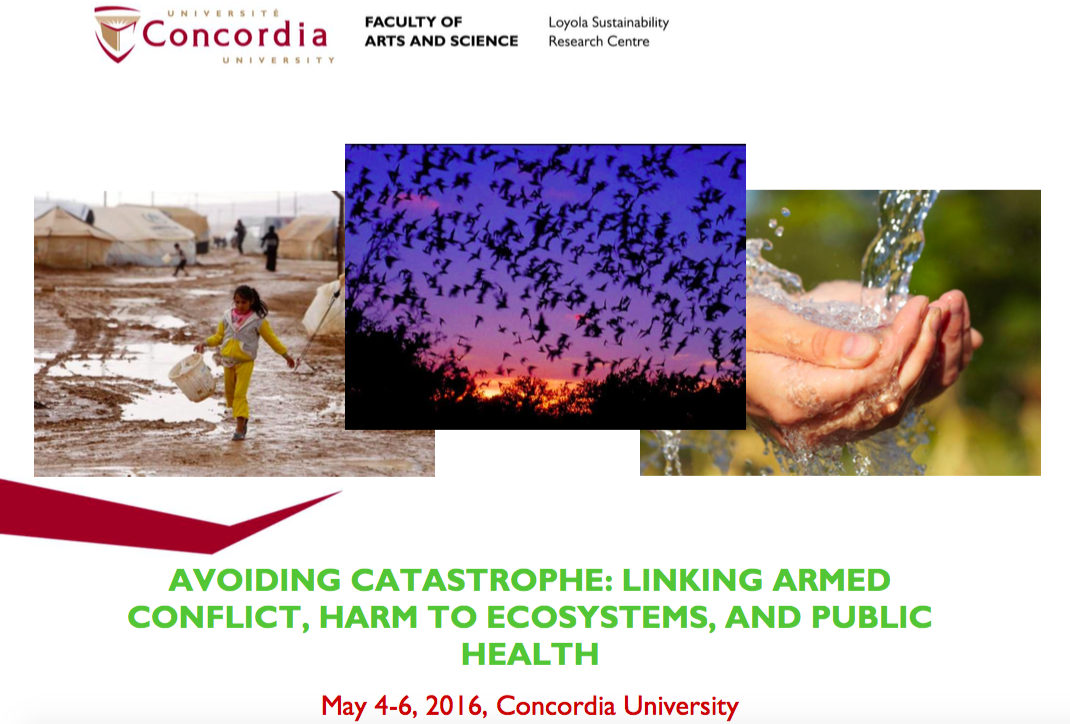Loyola Sustainability Research Centre is hosting an event on how to better resolve crises compared to efforts seen in the Ebola crisis
The Loyola Sustainability Research Centre is hosting a two day event to discuss how past resolutions to national disasters have failed and how many disasters are a result of combined drawn-out militarized conflict, environmental degradation and poor public health care infrastructures.
The event, titled “Avoiding Catastrophe: Linking Armed Conflict, Harm to Ecosystems and Public Health,” is funded by the Canadian Social Sciences and Humanities Research Council Connections Program. The event will take place on May 4 from 6 to 9 p.m. and May 5 from 9 to noon in room LB-125 at Concordia’s downtown campus.
“Often, governments base their decision-making processes on separate analytical frameworks for conflict, environmental degradation and public health, leaving their mutual interdependence understudied,” said Adan Suazo, Concordia’s Associate Member of the Loyola Sustainability Research Centre and Doctoral Researcher for the National Centre for Peace and Conflict Studies at the University of Otago.
Peter Stoett, the Director of the Loyola Sustainability Research Centre, said there is a lot of research being conducted now on how to respond to crises through strengthening support for public health, conservation of biodiversity and conflict resolution. “A lot of [research is] spurred from thinking about the Ebola crisis that we had a couple years ago and how dreadfully unprepared we really were to respond to that,” said Stoett. “Eventually we got it right, but it really took an awfully long time.” Suazo said the event will raise awareness and generate a discussion about these issues.
Stoett said when a nation faces a combined crises to public health, war and environmental degradation, there is amplified misery and chaos. The Haiti Earthquake, for example, was not properly managed, he said. “The effects [in Haiti] were much worse than they had to be because there was inadequate health infrastructure in place and it was [aggravated] by years of armed violence and environmental degradation,” he said, adding that there was an issue of deforestation in Haiti.
Suazo and Stoett were inspired to organize the event after reading an article discussing the connection between the Ebola outbreak and deforestation in Africa, said Suazo. “It really made us realize that we should perhaps expand our analytical focus a little bit more to include environmental degradation and public health within the purview of conflict—conflict being the glue for both fields,” he said. Suazo said he and Stoett have come to the conclusion the countries most affected by the Ebola outbreak are often post-conflict societies. “That cannot be a coincidence,” he said.
Speakers at the event will include a representative from Doctors Without Borders, the UN Secretariat for the Convention on Biological Diversity, the Montreal Institute for Genocide and Human Rights Studies, EcoHealth Alliance, the Consortium of Universities for Public Health and Future Earth. Professors from Concordia, McGill and the University of Toronto will also be speaking at the event.
“Avoiding Catastrophe: Linking Armed Conflict, Harm to Ecosystems and Public Health” will be hosted on Concordia’s Sir George Williams campus on May 4 from 6 to 9 p.m. and May 5 from 9 to noon in room LB-125.




